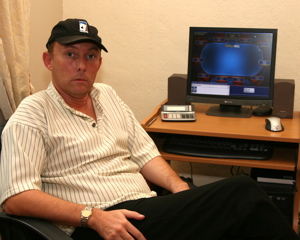 There are times in SNG’s where you are close to the bubble or on the bubble and you are either on a short stack or you are the shortest stack on the table. In these situations then you have one foot out of the tournament door. But this does not mean that you should simply throw your chips in mindlessly.
There are times in SNG’s where you are close to the bubble or on the bubble and you are either on a short stack or you are the shortest stack on the table. In these situations then you have one foot out of the tournament door. But this does not mean that you should simply throw your chips in mindlessly. To highlight what I mean then let us look at an actual situation here. This tournament is down to five handed play and you are the shortest stack with T900 and the blinds are 200 and 400. You are UTG and this tournament started with 10 players and each starting stack was T1500.
So we have a combined T15,000 on the table which is broken down as follows:
Big Blind – 4,300
Small Blind -- 3,700
Button -- 2,00
Cut-off -- 3,200
Hijack (hero) -- 900
What I see many players do in these situations is make an all-in raise with their remaining T900 because they are about to enter the big blind. But yet in these situations that can be precisely your best course of action, let me explain.
With a structure that pays the last three players then the other players knocking you out will elevate them to only one from the money and increase their overall equity in the tournament. So when you raise all in from the hijack which is also UTG then you had better expect to get several callers.
When this situation arises then expect the other players to passively check between them unless someone hits a powerful hand. This tactic will seriously diminish your chances of survival. But a T900 all-in raise by the short stack is only T500 more for the big blind and T700 for the small blind. Better players in the higher limits will not let you get an easy ride here. Lower stakes players will be far more defensive in these situations and sit back and hope to let someone else do the dirty work.
But as you move up the better players will certainly gang up on you. But yet those very same players who called your raise will fail to get involved if you fold your hand and deliberately go into the big blind and then call someone’s raise.
By purposefully going into the big blind then you have in effect created a situation where one of the other players can give you protection in the hand by raising preflop.
You post the T400 and it is folded to the button who makes a x3 raise and the small blind folds. Here you can call with any two cards and be happy to do so. You may not even be a dog to the range of a button raiser even approaching the bubble in an SNG.
But even if you are a dog then you are not that big of a dog to their range and your chances to double through have seriously increased. But you have also avoided a situation in which your opponents can call and then passively check the hand down against you. By calling and then winning this hand your stack will have grown to a much better T2,000.
While this is still only 5BB, you now have enough of a stack to create substantial preflop fold equity as your stack now has the potential to do serious damage to everyone on the table. You will also be able to better exploit bubble passivity as well and you can quite easily see your stack escalate to T3,000-T4,000 here very quickly.
In this situation with a stack of T900 UTG with blinds at 200,400 then I would need a pretty strong hand to move in with here. I would want something like a mid to high pocket pair or two high Broadway cards. But, and it is a big but, this only applies if you are up against stronger players who know to call and then passively check the hand down without firing into a dry pot with a mediocre hand.
If you feel that the players are much weaker than this and that more of them could fold then your range to move in from under the gun here would be far wider as weaker players will fold preflop and you may even get the hand heads up anyway. In fact in low-stakes SNG’s I have sat and watched games open mouthed where a chronically short stack has gone all in under the gun and it has been folded around to the big blind who also folded.
To let a small stack get back into contention like this is bad poker but this is precisely what I am talking about with regards trying to figure out just who you are going up against when contemplating whether or not to move all-in here or whether to make a calculated move by deliberately going into the big blind.
Carl ‘The Dean’ Sampson is sponsored by Cake Poker and can be seen at www.cakepoker.com/thedean